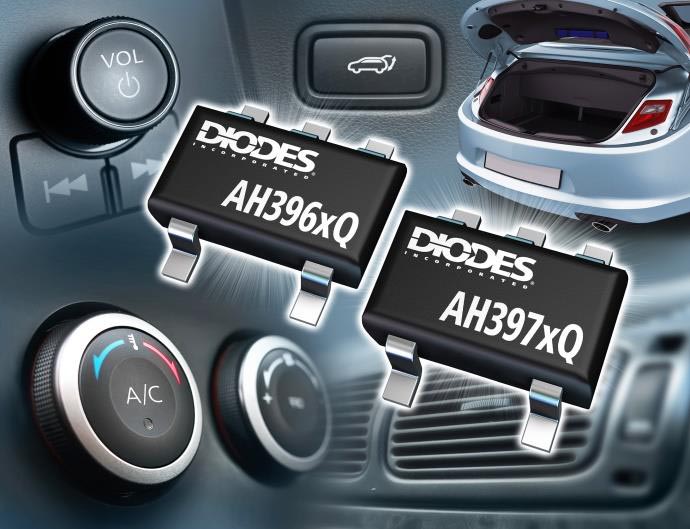Diodes Incorporated introduced a new portfolio of high-sensitivity Hall-effect sensors. Devices in the robust AH39xxQ series provide accurate speed and directional data or two independent outputs. These sensors are designed for industrial and automotive applications such as detecting rotational and linear speed/direction and determining the angular position of a rotating shaft.

In line with automotive battery requirements, the AH39xxQ series Hall-effect sensors operate over a wide supply voltage range of 2.7 V to 27 V. They also have a 40 V absolute maximum rating, enabling them to safely handle 40 V load dumps. Additionally, –18 V of reverse voltage protection guards against incorrect battery connections. For added robustness, the electrostatic discharge (ESD) protection provided by these devices exceed the automotive norms of 5 kV human body model (HBM) and 2 kV charge device model (CDM).
Three BOP/BRP options are offered, with typical values of 10/–10 gauss, 25/–25 gauss, and 75/–75 gauss, while their narrow operating window ensures accurate and reliable switching points. Dual-channel operation means these sensors can replace two latch switches, reducing PCB space and overall component costs. Combining chopper-stabilized amplifiers with an advanced Hall plate design mitigates switch point drift, ensuring accurate measurements over a broad temperature range.
The self-diagnostic features of the AH397xQ make them suitable for ISO 26262-compliant systems. For extra reassurance, these devices enter a safe operating mode if an error, such as overtemperature or undervoltage lockout, is detected.
The AH39xxQ series Hall-effect sensors from Diodes are AEC-Q100 Grade 0 qualified, manufactured in IATF 16949 certified facilities, and support PPAP documentation. They are supplied in TSOT25 packages.
